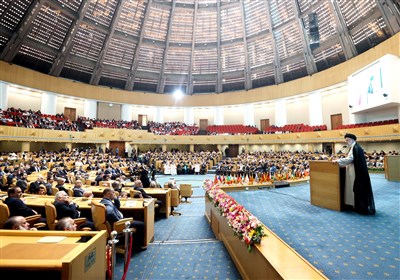France, UK Sign Deal to Stop Asylum Seekers Crossing Channel
TEHRAN (Tasnim) – The interior ministers of France and the United Kingdom have signed an agreement that will see more police patrol beaches in northern France in an attempt to stop people trying to cross the English Channel in small boats – a regular source of friction between the two countries.
French Minister of Interior Gerald Darmanin and British Home Secretary Suella Braverman signed the agreement in Paris on Monday, AP reported.
The British government has agreed to pay France about 72.2 million euros ($75m) in 2022-2023 – nearly 10 million euros ($10.3m) more than under an existing deal – in exchange for France increasing its security presence by 40 percent across sea access points on the coast.
That includes 350 more gendarmes and police guarding beaches in Calais and Dunkirk, as well as more use of drones and night vision equipment to help officers detect crossings.
The agreement contains proposals to fight crime across migration routes, with the two ministers agreeing that their countries would gather information from intercepted asylum seekers to help tackle smuggling networks.
No specific target for boat interceptions was included in the agreement.
British Prime Minister Rishi Sunak said the deal would mean “a 40-percent increase in the number of patrols happening, and for the first time, British officials embedded in French operations to strengthen coordination and the effectiveness of our operations”.
He said the agreement would be “a foundation for even greater cooperation in the months ahead”.
The UK receives fewer asylum seekers than many European nations, including Italy, France and Germany, but thousands of people from around the world travel to northern France each year in hopes of crossing the Channel.
Some want to reach the UK because they have friends or family there, others because they speak English or because they think they will be able to find work there.
In recent years, there has been a sharp increase in the number of people trying to cross the channel in dinghies and other small craft as authorities clamp down on other routes such as stowing away on buses.
More than 40,000 people have made the hazardous journey across one of the world’s busiest shipping lanes so far this year, up from 28,000 in all of 2021 and 8,500 in 2020.
Dozens have died over the years, including 27 people in November 2021 when a packed smuggling boat capsised.
Britain and France have long wrangled over how to stop the people-smuggling gangs that organise the journeys.
In an attempt to deter the crossings, Britain’s government has announced a controversial plan to send people who arrive in small boats on a one-way journey to Rwanda – a plan it says will deter people from crossing the Channel and break the business model of smuggling gangs.
Critics say the plan is immoral and impractical, and it is being challenged in the courts.
Critics also have criticised the British government for failing to process asylum applications quickly and for leaving thousands of people stuck in overcrowded holding centres and temporary accommodation.
Enver Solomon, chief executive of the Refugee Council charity in Britain, said enforcement measures would do little to stop desperate people attempting the dangerous crossings.
“The government must take a more comprehensive approach and create an orderly, fair and humane asylum system that recognises that the vast majority of those taking dangerous journeys are refugees escaping for their lives,” he said.
“It needs to face up to the fact it is a global issue which will not be resolved by enforcement measures alone.”






